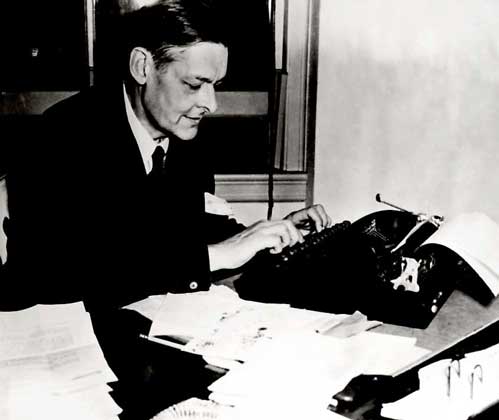The directory «Plots»
Eliot Thomas Stearns
(1888–1965)

American-British poet and critic, b. St. Louis, Mo. One of the most distinguished literary figures of the 20th cent., T. S. Eliot won the 1948 Nobel Prize in Literature. He studied at Harvard, the Sorbonne, and Oxford. In 1914 he established residence in London and in 1927 became a British subject. After working as a teacher and a bank clerk he began a publishing career; he was assistant editor of the Egoist (1917–19) and edited his own quarterly, the Criterion (1922–39). In 1925 he was employed by the publishing house of Faber and Faber, eventually becoming one of its directors. His first marriage, to Vivienne Haigh-Wood in 1915, was troubled, and ended with their separation in 1933. His subsequent marriage to Valerie Fletcher in 1957 was far more successful.
Eliot’s early poetical works—Prufrock and Other Observations (1917), Poems (1920), and The Waste Land (1922)—express the anguish and barrenness of modern life and the isolation of the individual, particularly as reflected in the failure of love. The Waste Land, whose published version reflects extraordinary editing by Eliot’s friend Ezra Pound, compelled immediate critical attention. His complex early poems, employing myths, religious symbolism, and literary allusion, signified a break with 19th-century poetic traditions. Their models were the metaphysical poets, Dante, the Jacobean dramatists, and French symbolists. Their meter ranged from the lyrical to the conversational. In his later poetry, notably Ash Wednesday (1930) and the Four Quartets (1935–42), Eliot turned from spiritual desolation to hope for human salvation. He accepted religious faith as a solution to the human dilemma and espoused Anglo-Catholicism in 1927.
Eliot was an extraordinarily influential critic, rejecting Romantic notions of unfettered originality and arguing for the impersonality of great art. His later criticism attempts to support Christian culture against what he saw as the empty and fragmented values of secularism. His outstanding critical works are contained in such volumes as The Sacred Wood (1920), For Lancelot Andrewes (1928), Selected Essays, 1917–1932 (1932), The Use of Poetry and the Use of Criticism (1933), Elizabethan Essays (1934), Essays Ancient and Modern (1936), and Notes towards a Definition of Culture (1948). Eliot’s plays attempt to revitalize verse drama and usually treat the same themes as in his poetry. They include Murder in the Cathedral (1935), dealing with the final hours of Thomas à Becket; The Family Reunion (1939); The Cocktail Party (1950); The Confidential Clerk (1954); and The Elder Statesman (1959). His complete poems and plays appeared in 1969, his letters in 1988, and his previously unpublished early poems (1909–17) in 1996.
Comoren Islands, 1977, Nobel prize winners
Great Britain, 2001, «The Addressing of Cats» by T. C. Eliot
Great Britain, 2006, T. S. Eliot
Guinea, 2008, T. S. Eliot, cats
Mozambique, 2011, Writers
Nicaragua, 1995, T. S. Eliot
Nicaragua, 1995, T. S. Eliot
Paraguay, 1977, Medal of Nobel prize of Literature
USA, 1986, T. S. Eliot
USA, 2000, Poster for musikal «Cats»